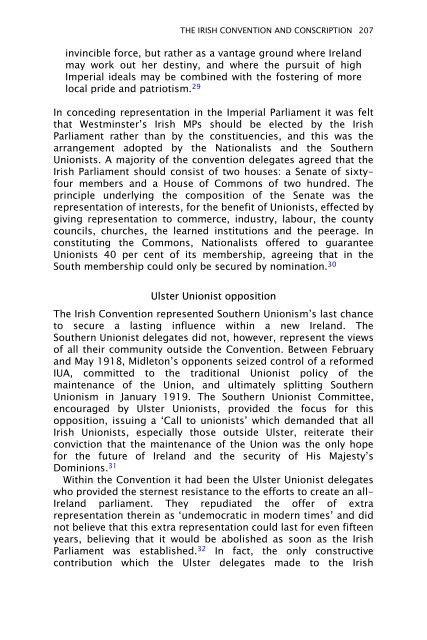Dividing Ireland: World War I and Partition
Dividing Ireland: World War I and Partition
Dividing Ireland: World War I and Partition
You also want an ePaper? Increase the reach of your titles
YUMPU automatically turns print PDFs into web optimized ePapers that Google loves.
THE IRISH CONVENTION AND CONSCRIPTION 207<br />
invincible force, but rather as a vantage ground where <strong>Irel<strong>and</strong></strong><br />
may work out her destiny, <strong>and</strong> where the pursuit of high<br />
Imperial ideals may be combined with the fostering of more<br />
local pride <strong>and</strong> patriotism. 29<br />
In conceding representation in the Imperial Parliament it was felt<br />
that Westminster’s Irish MPs should be elected by the Irish<br />
Parliament rather than by the constituencies, <strong>and</strong> this was the<br />
arrangement adopted by the Nationalists <strong>and</strong> the Southern<br />
Unionists. A majority of the convention delegates agreed that the<br />
Irish Parliament should consist of two houses: a Senate of sixtyfour<br />
members <strong>and</strong> a House of Commons of two hundred. The<br />
principle underlying the composition of the Senate was the<br />
representation of interests, for the benefit of Unionists, effected by<br />
giving representation to commerce, industry, labour, the county<br />
councils, churches, the learned institutions <strong>and</strong> the peerage. In<br />
constituting the Commons, Nationalists offered to guarantee<br />
Unionists 40 per cent of its membership, agreeing that in the<br />
South membership could only be secured by nomination. 30<br />
Ulster Unionist opposition<br />
The Irish Convention represented Southern Unionism’s last chance<br />
to secure a lasting influence within a new <strong>Irel<strong>and</strong></strong>. The<br />
Southern Unionist delegates did not, however, represent the views<br />
of all their community outside the Convention. Between February<br />
<strong>and</strong> May 1918, Midleton’s opponents seized control of a reformed<br />
IUA, committed to the traditional Unionist policy of the<br />
maintenance of the Union, <strong>and</strong> ultimately splitting Southern<br />
Unionism in January 1919. The Southern Unionist Committee,<br />
encouraged by Ulster Unionists, provided the focus for this<br />
opposition, issuing a ‘Call to unionists’ which dem<strong>and</strong>ed that all<br />
Irish Unionists, especially those outside Ulster, reiterate their<br />
conviction that the maintenance of the Union was the only hope<br />
for the future of <strong>Irel<strong>and</strong></strong> <strong>and</strong> the security of His Majesty’s<br />
Dominions. 31<br />
Within the Convention it had been the Ulster Unionist delegates<br />
who provided the sternest resistance to the efforts to create an all-<br />
<strong>Irel<strong>and</strong></strong> parliament. They repudiated the offer of extra<br />
representation therein as ‘undemocratic in modern times’ <strong>and</strong> did<br />
not believe that this extra representation could last for even fifteen<br />
years, believing that it would be abolished as soon as the Irish<br />
Parliament was established. 32 In fact, the only constructive<br />
contribution which the Ulster delegates made to the Irish








